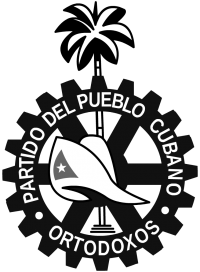Partido Ortodoxo
Political party in Cuba From Wikipedia, the free encyclopedia
The Party of the Cuban People – Orthodox (Spanish: Partido del Pueblo Cubano – Ortodoxos, PPC-O), commonly shortened to the Orthodox Party (Spanish: Partido Ortodoxo), was a Cuban populist political party. It was founded in 1947 by Eduardo Chibás in response to government corruption and lack of reform. Its primary aims were the establishment of a distinct national identity, economic independence and the implementation of social reforms.
Orthodox Party Partido Ortodoxo | |
|---|---|
 | |
| Leader | Eduardo Chibás Emilio Ochoa |
| Founded | 15 May 1947 |
| Dissolved | 1952 |
| Split from | Authentic Party |
| Headquarters | Havana |
| Newspaper | CMQ Radio (FM) |
| Youth wing | Orthodox Youth (Juventud Ortodoxa) |
| Ideology | Cuban nationalism[1][2] Anti-corruption[3] Anti-imperialism[4] Left-wing populism[1][5][6] Left-wing nationalism[7] Economic nationalism[1] Direct democracy Factions: Democratic socialism[8][9] Social democracy Social corporatism Liberalism Agrarian reform |
| Political position | Centre-left[1] to left-wing[10][9][11] |
| Colors | Black |
| Slogan | "Shame against money" (Vergüenza contra dinero) |
History
In the 1948 general elections Chibás came third in the presidential election, whilst the party won four seats in the House of Representatives. In the 1950 mid-term elections they won nine. Chibás' cousin, Roberto Agramonte, was the favorite to win the 1952 election (for the Ortodoxos) but Fulgencio Batista staged a coup almost three months before the election.
Fidel Castro was an active member of the PPC-O in the late 1940s and early 1950s. He intended to run as a PPC-O candidate for the Cuban parliament prior to Batista's coup.[12][13]
Ideology and platform
Summarize
Perspective
The PPC-O was a centre-left party, open to all that wanted join to it. Generally populist, there were not distinct internal factions or organizations, with all members united by their support of Eduardo Chibás' goals and ideals. The party's composition included several ideological groups ranging from the political centre to the left:
- Former members of the Authentic Party: staunch nationalists, supporting anti-imperialism and revolutionary goals
- Former members of the Popular Socialist Party: young socialists and communist soldiers, disappointed by their party's misconduct
- Former members of the Liberal Party of Cuba: petite bourgeoisie, with more pro-business views
The political program reflected PPC-O's catch-all nature, claiming support for:[14]
- Direct democracy
- A multi-party political system[15][16]
- The fight against political corruption, embezzlement and criminals
- Progressivism
- Anti-imperialism (mainly anti-Americanism) and nationalism
- Agrarian reform: Abolition of latifundios and monoculture, agricultural diversification
- Fair payments and economic redistribution
- Nationalization of railways, power plants, and telecommunications
- The free market and respect for private ownership
- Social corporatism and labor rights
The left-wing of the PPC-O had its most influence in the party's youth wing, the Orthodox Youth (Juventud Ortodoxa). A 1948 pamphlet by the Orthodox Youth espoused a Marxist-inspired, democratic socialist platform, but it was also critical of the Soviet-aligned Popular Socialist Party, which upheld Marxism–Leninism.[8]
References
Wikiwand - on
Seamless Wikipedia browsing. On steroids.
